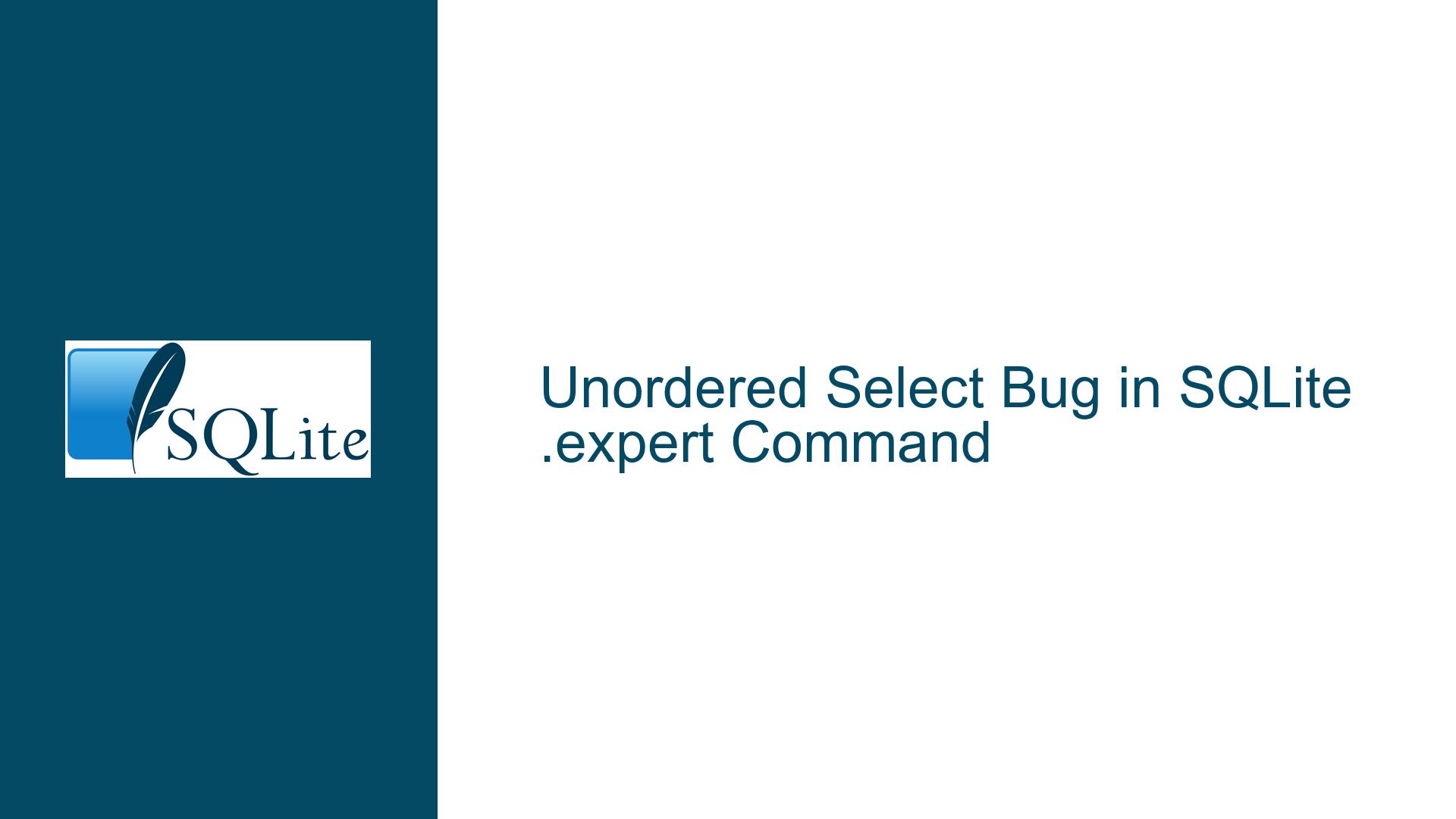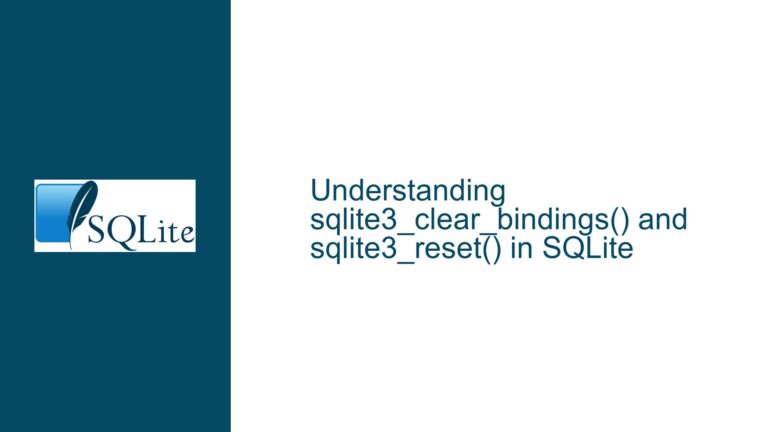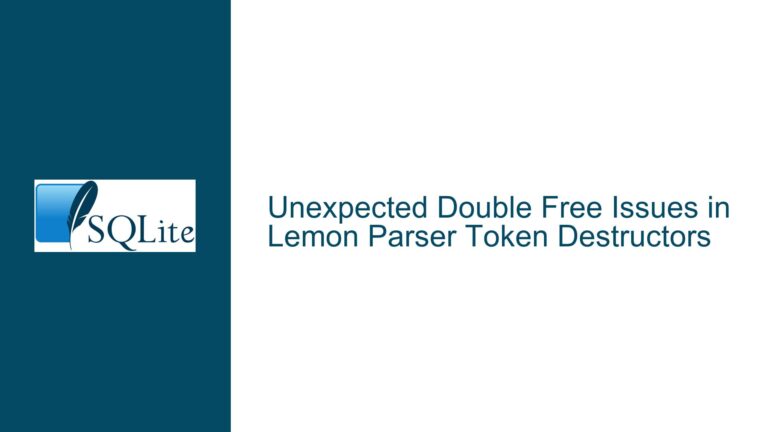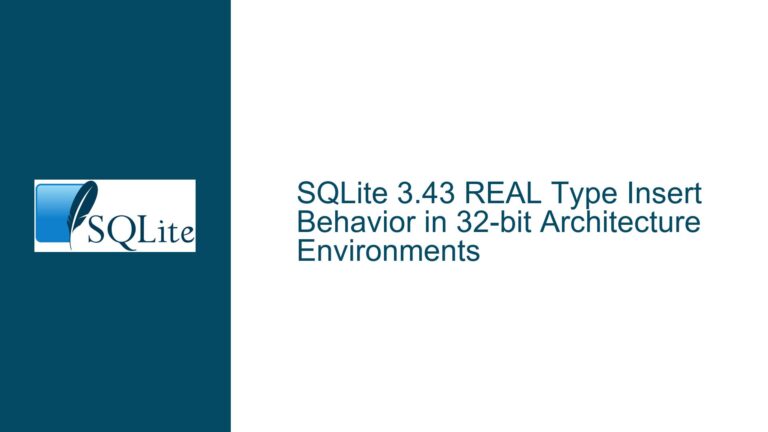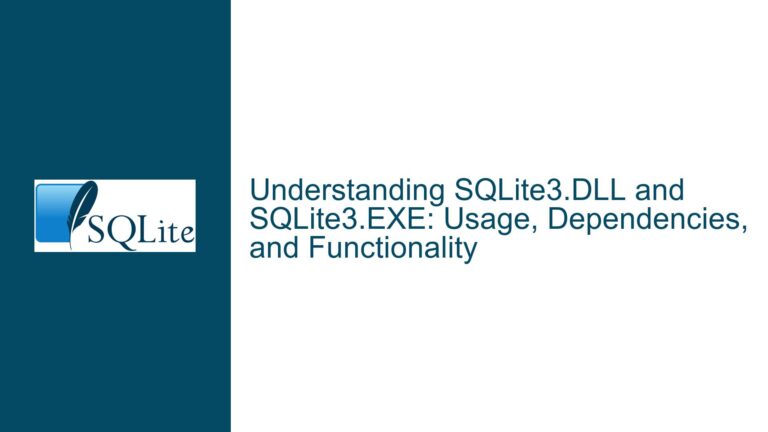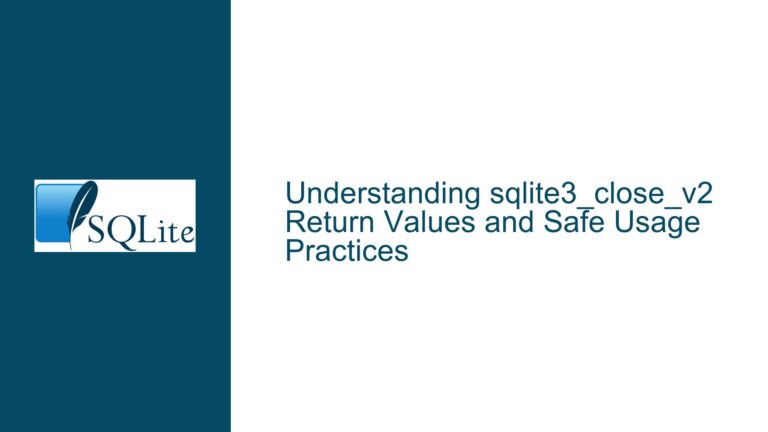Unordered Select Bug in SQLite .expert Command
Issue Overview: Reverse Unordered Selects and .expert Command Interaction
The core issue revolves around the interaction between the SQLite .expert command and the reverse_unordered_selects pragma. The .expert command is designed to analyze SQL queries and suggest optimal indexes for improving query performance. However, when the reverse_unordered_selects pragma is enabled, the .expert command fails to recognize the existence of a newly created table and its associated index, resulting in the error message: sqlite3_expert_new: no such table: main.t.
The reverse_unordered_selects pragma is a debugging tool that reverses the order of results from SELECT statements that do not have an explicit ORDER BY clause. This pragma is typically used to test the robustness of applications by ensuring they do not rely on the default order of results, which is not guaranteed by SQL standards. When this pragma is enabled, it appears to interfere with the internal workings of the .expert command, causing it to fail in recognizing the table main.t.
The issue manifests in the following sequence of commands:
- Enable
reverse_unordered_selectspragma. - Create a table
twith a single columnxof typetext. - Create an index
idx_t_xon the columnxof tablet. - Execute the
.expertcommand.
At this point, the .expert command fails with the error sqlite3_expert_new: no such table: main.t, indicating that it cannot find the table t in the main schema. This behavior is unexpected because the table and index were created successfully, and the .expert command should be able to analyze them.
Possible Causes: Internal State and Pragma Interference
The root cause of this issue lies in the interaction between the reverse_unordered_selects pragma and the internal state management of the .expert command. The .expert command relies on the SQLite internal schema representation to analyze and suggest indexes. When the reverse_unordered_selects pragma is enabled, it alters the behavior of SELECT statements, which in turn may affect how the internal schema representation is accessed or interpreted by the .expert command.
One possible explanation is that the reverse_unordered_selects pragma modifies the internal query execution plan or the schema cache in a way that the .expert command cannot correctly interpret. The .expert command may be attempting to query the schema information using a SELECT statement that is affected by the reverse_unordered_selects pragma, leading to an incorrect or incomplete schema representation.
Another possibility is that the .expert command relies on a specific order of schema elements when analyzing tables and indexes. The reverse_unordered_selects pragma could be disrupting this order, causing the .expert command to miss or misidentify the table t and its index idx_t_x.
Additionally, the .expert command may not be designed to handle the altered behavior introduced by the reverse_unordered_selects pragma. The pragma is primarily intended for debugging purposes, and its interaction with other SQLite features, such as the .expert command, may not have been thoroughly tested.
Troubleshooting Steps, Solutions & Fixes: Resolving the .expert Command Failure
To resolve the issue where the .expert command fails to recognize the table main.t when the reverse_unordered_selects pragma is enabled, several troubleshooting steps and potential solutions can be explored.
Step 1: Verify the Table and Index Creation
Before diving into the interaction between the .expert command and the reverse_unordered_selects pragma, it is essential to ensure that the table t and the index idx_t_x are created successfully. This can be verified by running the following commands:
SELECT name FROM sqlite_master WHERE type = 'table';
SELECT name FROM sqlite_master WHERE type = 'index';
These queries should return the names of the table t and the index idx_t_x, respectively. If the table and index are not listed, there may be an issue with their creation, which should be addressed before proceeding.
Step 2: Disable the reverse_unordered_selects Pragma
Since the issue is related to the reverse_unordered_selects pragma, a straightforward workaround is to disable this pragma before running the .expert command. This can be done by executing the following command:
PRAGMA reverse_unordered_selects = off;
After disabling the pragma, the .expert command should be able to recognize the table main.t and analyze it correctly. This workaround is effective if the primary goal is to use the .expert command for index analysis, and the reverse_unordered_selects pragma is not required for the current session.
Step 3: Use an Alternative Debugging Method
If the reverse_unordered_selects pragma is essential for debugging purposes, an alternative approach is to use a different method to test the robustness of the application. For example, instead of relying on the reverse_unordered_selects pragma, you can manually alter the order of results in SELECT statements by adding an explicit ORDER BY clause with a random or varying condition. This approach allows you to test the application’s behavior without interfering with the .expert command.
Step 4: Modify the .expert Command Implementation
For advanced users or those with access to the SQLite source code, another potential solution is to modify the implementation of the .expert command to handle the reverse_unordered_selects pragma correctly. This would involve analyzing how the .expert command queries the schema information and ensuring that it is not affected by the pragma. This approach requires a deep understanding of the SQLite internals and should only be attempted if other solutions are not feasible.
Step 5: Report the Issue to the SQLite Development Team
If the issue persists and none of the above solutions are satisfactory, it is recommended to report the issue to the SQLite development team. Providing a detailed description of the problem, including the steps to reproduce it and any relevant error messages, will help the developers investigate and potentially fix the issue in a future release. The issue can be reported through the SQLite forum or the official SQLite bug tracking system.
Step 6: Use a Different SQLite Version
In some cases, the issue may be specific to a particular version of SQLite. If the problem is encountered in SQLite version 3.45.1 or 3.46.0, it may be worth testing the behavior in a different version of SQLite. For example, you can try using an older version where the issue does not occur or a newer version where the issue may have been resolved. This approach can help determine if the issue is version-specific and guide the decision on whether to upgrade or downgrade the SQLite installation.
Step 7: Analyze the SQLite Schema Cache
The SQLite schema cache is an internal mechanism that stores information about the database schema, including tables, indexes, and other objects. The .expert command relies on this cache to analyze and suggest indexes. If the reverse_unordered_selects pragma is affecting the schema cache, it may be necessary to investigate how the cache is being modified and whether it can be reset or refreshed before running the .expert command. This can be done by executing the following command:
PRAGMA schema_version;
This command increments the schema version, forcing SQLite to reload the schema information from the database file. After running this command, the .expert command may be able to recognize the table main.t correctly.
Step 8: Use a Different Database Connection
Another potential workaround is to use a different database connection for running the .expert command. The reverse_unordered_selects pragma is connection-specific, meaning that it only affects the current database connection. By opening a new connection to the same database and running the .expert command in that connection, the issue may be avoided. This approach can be implemented programmatically or by using a different SQLite shell session.
Step 9: Review the SQLite Documentation and Community Resources
The SQLite documentation and community resources, such as forums and mailing lists, can provide valuable insights into the behavior of the .expert command and the reverse_unordered_selects pragma. Reviewing these resources may reveal known issues, workarounds, or best practices for using these features together. Additionally, other users may have encountered similar issues and shared their experiences and solutions, which can be helpful in troubleshooting the problem.
Step 10: Consider Alternative Index Analysis Tools
If the .expert command continues to fail when the reverse_unordered_selects pragma is enabled, it may be worth considering alternative tools for index analysis. SQLite offers several other methods for analyzing and optimizing queries, such as the EXPLAIN QUERY PLAN command, which provides detailed information about how SQLite executes a query. Additionally, third-party tools and libraries may offer more advanced features for index analysis and query optimization, which can be used as an alternative to the .expert command.
In conclusion, the issue of the .expert command failing to recognize the table main.t when the reverse_unordered_selects pragma is enabled can be addressed through a combination of troubleshooting steps and potential solutions. By verifying the table and index creation, disabling the pragma, using alternative debugging methods, modifying the .expert command implementation, reporting the issue to the SQLite development team, using a different SQLite version, analyzing the schema cache, using a different database connection, reviewing documentation and community resources, and considering alternative index analysis tools, the problem can be effectively resolved.
